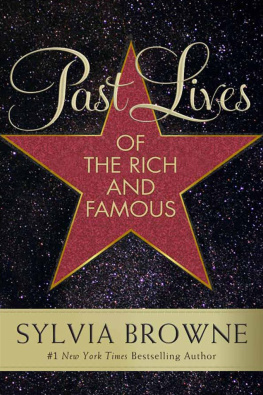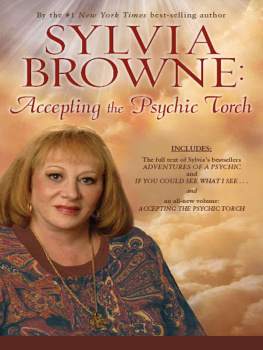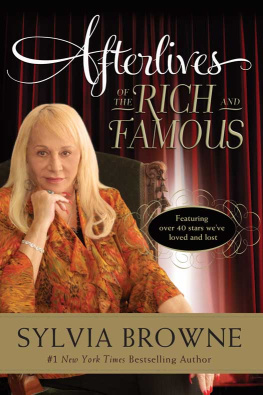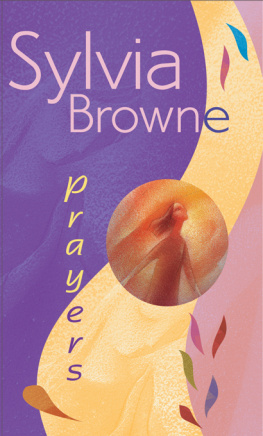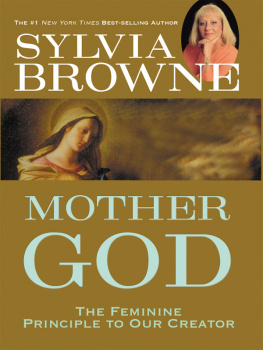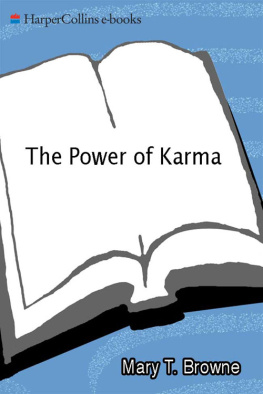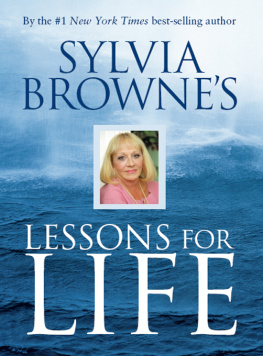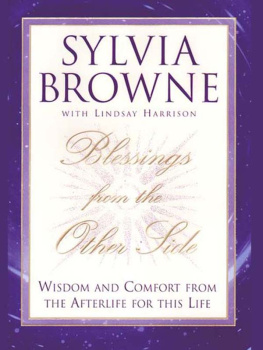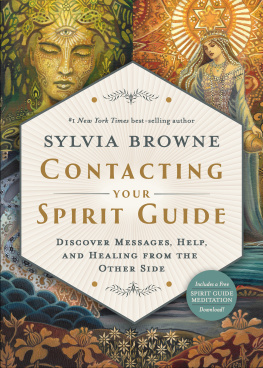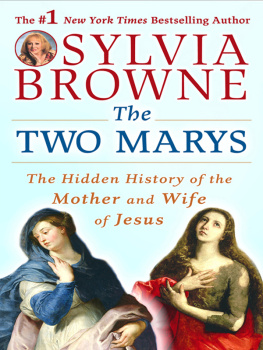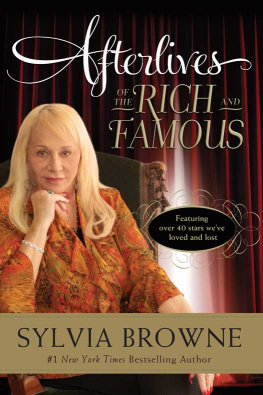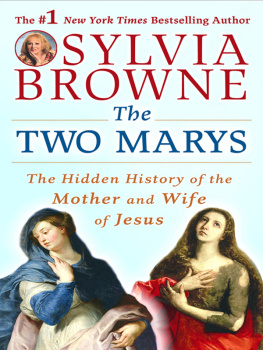
Past Lives of the Rich and Famous
SYLVIA BROWNE
with Lindsay Harrison

To my husband, Michael Ulery,
who at long last is the man of my dreams.
Contents
I dont ever want you to take my word for it, or anyone elses, when youre exploring and arriving at the fundamental beliefs that resonate in your soul and, most of all, when those beliefs answer more questions than they raise. I want you to keep an open mind, educate yourself on a variety of philosophies, and pay attention to what makes sense to you.
In other words, as you read these pages, I want you to think .
How can a child, from a perfectly normal, unremarkable family, suddenly begin playing the piano with the skill of a virtuoso and composing music at the age of five?
How and why does a three-year-old child born and raised in Alaska develop what turns into a lifelong, passionate curiosity about the American Civil War?
Why are there specific places on earth that youve yearned to go for as long as you can remember, and languages youve yearned to learn, while other places and languages are of no interest to you at all?
How can you land in a strange city youve never been in before and find that, impossibly, you not only feel at home there, you actually seem to know your way around?
Why are there certain people you meet for the first time and have to fight an urge to say, Hello again! Where have you been?
Why were you born with your own unique set of preferences and aversions to things that, by definition, youve never been exposed to in this life?
Why, without warning or logic, do you suddenly develop a mortal fear of something youve never been afraid of before, from flying to water to darkness to choking to heights? For that matter, why were you born with any mortal fears at all?
What would prompt a six-year-old child to thank his mother for breakfast by saying, Youre the best of all twelve moms Ive ever had?
Where would a ten-year-old girl come up with a voice and an affinity for singing opera?
Ask those questions to any number of scientists, theologians, psychologists, and other experts on human behavior. Theyre likely to reply with either a blank stare, some double-talk that makes no sense at all, or that common, meaningless response, It just happens. Wouldnt I dont have the first clue be a lot more honest?
I do have the first clue. I have an explanation that answers every one of those questions, and thousands more, and I will never understand why theres such reluctance among so many to embrace and celebrate that explanation, because it confirms the promise God made to all of us at the moment our souls were createdvery simply, that we are eternal. It doesnt just mean that we always will be from now on. It means we always have been . So, accepting the fact that weve always existed, where have we been since the beginning of time? And what have we been doing to occupy ourselves? Nothing? Lying around on clouds playing harps? Really? I dont believe that for one second, and neither do you.
Weve each been living life after life after life, in our Home on the Other Side and here on earth as well, on a perpetual, sacred journey toward our spirits greatest potential, in joyful service to our Creator. He didnt create a random, imperfect, haphazard universe for us to occupy. He presented us with an infinity of perfection and logic. His creation makes sense. Its cyclical, and its orderly. To suggest, as many theologians do, that at the end of our one and only lifetime, God assesses our performances and decides whether we should be rewarded or punished is to suggest that God, who adores us unconditionally as His own beloved children, gives us one opportunity to please Him, and if we fail, He throws up His hands and banishes us to an eternity of hell. Does that really make sense to you?
Me neither.
Ive actually had any number of people say to me, through all these decades of readings, lectures, salons, and television appearances, Of course I dont believe in reincarnation. Im a Christian. To which I say, as a fellow (Gnostic) Christian, So am I! So, think !
Please dont ever get the idea that my absolute belief in reincarnation is arbitrary, something I decided to embrace because thats just how goofy we psychics are. I was brought up in Catholic school. I minored in theology and world religion in college. Ive spent my life passionately devouring every religious and spiritual book I can get my hands on, from the teachings of Buddha and Muhammad, to the Tantras, to the Egyptian Book of the Dead, to the Talmud and the Koran, to the Bhagavad Gita, to Elaine Pagelss The Gnostic Gospels, to the life of Apollonius of Tyana, a Greek spiritual healer and teacher who was a contemporary of Christ. Ive studied with priests, yogis, ministers, rabbis, nuns, Tibetan monks, and Zen masters. And I can honestly tell you that as a result of all that and much, much more, my belief in past lives has grown stronger, to the point where I no longer think of it as something I believe; I think of it as something I know .
I was especially intrigued to discover that most of the worlds great religionsincluding Christianity, until Pope Constantine restructured it in the sixth centuryembrace the truth of reincarnation. It inspired me to return to the Bible and look for the references to reincarnation that I was sure had to be there. I refused to believe that Pope Constantine, no matter how determined he might have been, managed to get his hands on every copy of every translation of the Holy Scripture and toss out everything he didnt agree with.
This search, this insatiable show-me curiosity common to us Missouri natives, led to my becoming a tireless, rabid student of the Bible, all twenty-six versions of it. And as thorough as Im sure Pope Constantine tried to be, I was delighted to discover that, even in translations of the Bible written after his death, several references to reincarnation remained intact, if you spend a few extra moments looking at them more closely than just giving them a passing glance.
The ninth chapter of John, for example, tells the story of Jesus and his disciples happening upon a man who was born blind. The disciples asked Jesus, Master, who did sin, this man, or his parents, that he was born blind?
The disciples, in other words, were curious about the possibility that the mans blindness was a punishment for sins hed committed. But since he had been blind since birth, what possible opportunity would he have had to commit sins if it werent in a past life, unless hed been creative enough to find a way to sin in the womb?
In Matthew 17:1113 theres an even more obvious reference to reincarnation, during a talk Jesus has with three of his disciples, Peter, James, and John: Elijah is indeed coming and will restore all things; but I tell you that Elijah has already come, and they did not recognize him, but they did to him whatever they pleased. Then the disciples understood that he was speaking to them about John the Baptist.
Now, if Elijah was still coming but had already come, obviously Jesus was referring to two separate incarnations. And they did not recognize him as Elijah in that previous incarnation, but the disciples understood that Elijahs previous incarnation was a lifetime as John the Baptist, who was imprisoned and beheaded by Herod, the king of Judea. I cant think of a clearer example of they did to him whatever they pleased than imprisoning and beheading someone. But more to the point, if Jesus Christ himself accepted reincarnation as the truth, as he clearly did, who are any of us to doubt him? Which brings us back to my original question: Why is there such a common perception that you can be a Christian or you can believe in reincarnation, but you cant do both?
Next page
